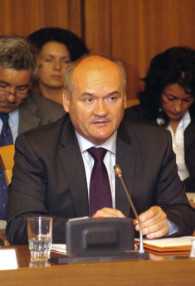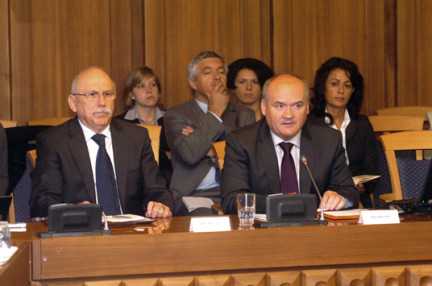Appointment Of Csaba Hende Supported By The National Security Committee
Szöveg: László Szűcs | 2010. május 27. 6:18One of the items on the agenda of the first meeting of the National Security Committee of the National Assembly, held on 25 May, was the hearing of Dr. Csaba Hende, candidate for minister of defence, prior to his appointment. The committee has supported the appointment of the candidate.
The National Security Committee of the National Assembly held its first meeting on 25 May in the office building of MPs. Dr. Zsolt Molnár, MSZP (Hungarian Socialist Party), the chairman of the committee greeted the participants and announced that prime minister-elect Viktor Orbán had informed the speaker of the National Assembly about candidate ministers therefore the first item on the agenda of the committee meeting was the hearing of the candidate defence minister prior to his appointment.
Dr. Csaba Hende said the defence minister’s tasks related to national security services are set forth in Act CXXV of 1995. The minister supervises two national security services: the Military Intelligence Office and the Military Security Office, the responsibilities of which are set forth in the same act. In line with this, the task of the defence minister is to prepare bills and government decisions concerning the operation of services he is responsible for. For example as their authorised leader, he assigns tasks and can give orders to national security services, furthermore he has to specify the tasks of director generals every six months.

– The tasks, sphere of competence, and responsibilities are set forth in this act. I am ready to take on this responsibility and perform my duties – stated Csaba Hende.
Following the short presentation, deputy chairman Ervin Demeter, FIDESZ (Young Democrats’ Alliance) asked the candidate about his relationship with the Hungarian Defence Forces and the national security services during his career. In his response Csaba Hende explained that he joined the MoD in 1991 at the request of defence minister Lajos Für, where in the first year he was working as a parliamentary secretary and in the second year he became the head of the legal and administrative department. Following that, he was working as secretary to the cabinet, i.e. the ministry’s chief of staff. The candidate minister added: he also participated in the elaboration, six-party negotiations, and enactment of the Home Defence Act of 1993, born in this period. It passed with a more than 99 per cent majority vote, which is unprecedented and also impressive because they managed to enact a comprehensive sectoral code only a few months before the1994 election campaign – added Csaba Hende.
– As a senior official of the Ministry of Defence, I was in close daily working contact with the operation of military secret services. I have also learned about their operation and met the personnel – said Csaba Hende, who also told the committee that in 1998, as the political secretary of state of the Ministry of Justice of the Orbán cabinet he had weekly meetings with the directors and deputies of military and civil secret services. As member of parliament, in the second half of the previous administration was the member of the National Security Committee.
– In line with the country’s 2002 commitment to NATO, we have to increase defence spending up to 1.81 per cent of the GDP and today we are halfway. How can we fulfil this commitment? – asked Lajos Mile, the representative of LMP (Politics Can Be Different).
In his response Csaba Hende underlined that unfortunately, the commitment announced at the NATO summit was not fulfilled then and has not been fulfilled since then. Therefore in 2009, the government decision on the National Military Strategy reduced it to 1.3 per cent. The previous government had discussed this step with the allies. But unfortunately, one of the ministries to lose the most as a result of stringent budgetary measures in the last two years was the Ministry of Defence, consequently, the actual defence spending is half the amount set forth in the 2002 commitment – he said.
– I cannot comment on budgetary issues for the time being, since the state of the country has not been examined yet. We could not inspect the budget yet and we do not know what sort of internal reserves there are, what sort of constraints, restrictions will determine our activity. Depending on the possibilities, I will do my best to achieve that the country can spend the necessary amount on defence – said the candidate defence minister.
Following that, the chairman of the National Security Committee, Zsolt Molnár, MSZP asked further questions. First he wanted to know what the candidate’s expectations of foreign missions and military secret services are and if he wishes to inform the committee about these expectations. – Are you planning any change in the military secret services? – was the next question. Zsolt Molnár also inquired about the nature of cooperation the new minister will try to build with the minister for foreign affairs in the field of military and civil services. "After what events would you say you were successful as a minister, and do you see an opportunity to put more emphasis on defence spending and within that, budgetary resources earmarked for military secret services?" – the chairman of the committee continued his questions.
Csaba Hende underlined in his response that our participation in missions is one of the most important areas of the Hungarian Defence Forces and in the six-monthly tasking documents for the leaders of secret services he will be dealing with these issues as well.

– The main task of the services on a mission is increasing the personal safety of troops serving there – said Csaba Hende, adding that his plans are that he will visit the Afghanistan contingent as soon as possible and inquire about their safety because there are also some worrying news coming from the region. Naturally, he will update the committee on all these measures and procedures whenever they wish or in the scope of regular updates as by law enacted – the candidate minister added.
In response to the second question of the chairman, Csaba Hende said: at the moment he is not planning any organisational change in the military secret services. His answer to the third question was that in accordance with law, military and civil secret services will cooperate.
– In my view the Hungarian Defence Forces are, in many respect, on the wrong track. The objectives are laid down in the Constitution and they are also listed in acts. It seems to me that today the Hungarian Defence Forces have limited capabilities and means to carry out these tasks. There are serious deficiencies as regards national defence duties set forth in the Constitution in the first place – said Csaba Hende, according to whom the Hungarian Defence Forces and the Ministry of Defence have also been shaken by a deep moral crisis. Therefore he can regard himself a successful minister only if he can put an end to this crisis and restore, even increase public confidence in the Hungarian Defence Forces – in other words, if the Hungarian nation is once again proud of its soldiers, without restraint. For him it will also be a success if, as a result of redevelopment, they get closer to the real objectives laid down in the Constitution and the Home Defence Act as the tasks of the Hungarian Defence Forces.
It follows from the National Military Strategy and the commitment it involves that in coming years, a higher proportion of the GDP will have to be earmarked for the defence budget, therefore military secret services will also have a bigger budget – was Csaba Hende’s answer for the fourth question.
– In addition to the present framework of the Hungarian Defence Forces, are you planning to establish any organisational unit or armed forces? – Zsolt Molnár asked his last question. In his response the candidate minister emphasised: no armed forces, organisations can be established outside the framework of the Hungarian Defence Forces. It is forbidden by law and by the Constitution, therefore this idea cannot even come up.
– The fact that the Hungarian Defence Forces are a military organisation that does not have reserve troops at the moment is another issue – said Csaba Hende, underlining that although there is a voluntary reservist system, there are only 15 people in the register. This is what the previous parliament and government, very rightly, realised when they made the decision to establish a 4000-strong voluntary reservist contingent, which – according to current plans – would be filled up between 2012 and 2020. In the opinion of the candidate minister this process will have to be accelerated because the Hungarian Defence Forces have many specialised tasks which come up only provisionally. Therefore it is logical to fill these positions with reservists of the voluntary reservist force, whenever and as long as it is necessary – said Csaba Hende.
Csaba Hende’s appointment was supported by the National Security Committee of Parliament with 7 in favour and one abstention. There will be another hearing later this week for the future defence minister before the Defence Committee.